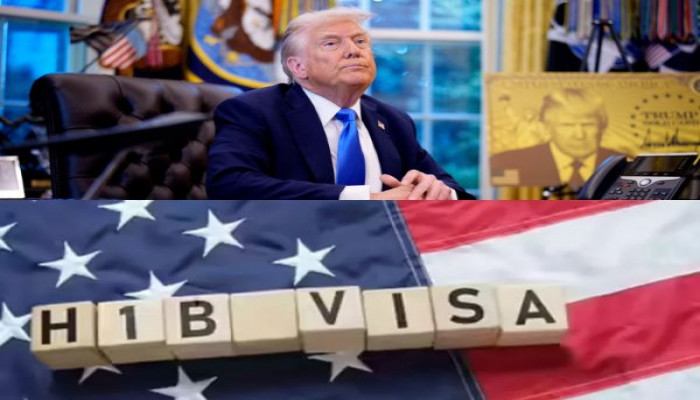Unions, businesses and faith groups challenge Trump’s $100,000 H-1B visa fee in court
- In Reports
- 07:38 PM, Oct 06, 2025
- Myind Staff
A group of labour unions, employer associations and religious organisations filed a lawsuit on Friday to stop President Donald Trump’s plan to charge $100,000 for every new H-1B visa issued to highly skilled foreign workers.
The case was filed in a federal court in San Francisco and marks the first legal challenge to a proclamation Trump made two weeks ago announcing the hefty new fee as part of his broader push to limit immigration to the United States.
The petitioners include the United Auto Workers union, the American Association of University Professors, a nurse recruitment agency and several religious groups. They argued that while the president has some power to control who can enter the country, that authority does not allow him to override laws passed by Congress that govern the H-1B visa program.
White House spokeswoman Abigail Jackson defended the move, saying in a statement that the administration’s actions were lawful and aimed at “discouraging companies from spamming the system and driving down American wages, while providing certainty to employers who need to bring the best talent from overseas.”
The H-1B visa program lets American companies hire foreign professionals for specialised roles, and the tech industry in particular depends heavily on it to fill high-skill positions.
Critics of the H-1B system say it is often abused by firms to replace American workers with cheaper foreign labour. But business groups and large companies argue that the program is crucial to address the ongoing shortage of qualified US workers in fields like engineering and information technology.
At present, companies that hire H-1B workers usually pay between $2,000 and $5,000 in fees, depending on their size and other conditions.
Trump’s new order prevents any new H-1B visa holder from entering the country unless their employer pays an additional $100,000. The administration clarified that the rule will not affect people who already have H-1B visas or those who applied before September 21.
Trump justified the order by invoking his powers under federal immigration law, claiming that allowing too many foreign nationals could harm US interests.
He said that large numbers of low-paid foreign workers have weakened the credibility of the H-1B program and that it poses a national security risk by discouraging Americans from pursuing careers in science and technology. Trump also argued that the “large-scale replacement of American workers” through the H-1B system threatens both the nation’s economy and security.
The plaintiffs countered that Trump has no legal authority to change the rules governing the visa program and cannot, under the US Constitution, impose new fees or taxes to generate revenue since that power lies with Congress.
“The Proclamation transforms the H-1B program into one where employers must either ‘pay to play’ or seek a ‘national interest’ exemption, which will be doled out at the discretion of the Secretary of Homeland Security, a system that opens the door to selective enforcement and corruption,” the lawsuit stated.
They also accused federal agencies like the Department of Homeland Security’s US Citizenship and Immigration Services and the US State Department of implementing the order without proper rulemaking procedures and without considering how “extorting exorbitant fees will stifle innovation.”
The H-1B visa program offers 65,000 visas each year for foreign professionals in specialised roles, with another 20,000 reserved for those holding advanced degrees. Each visa typically lasts between three and six years.
India continues to be the biggest recipient of H-1B visas, accounting for 71% of approvals last year, followed by China at 11.7%, according to official data.







Comments